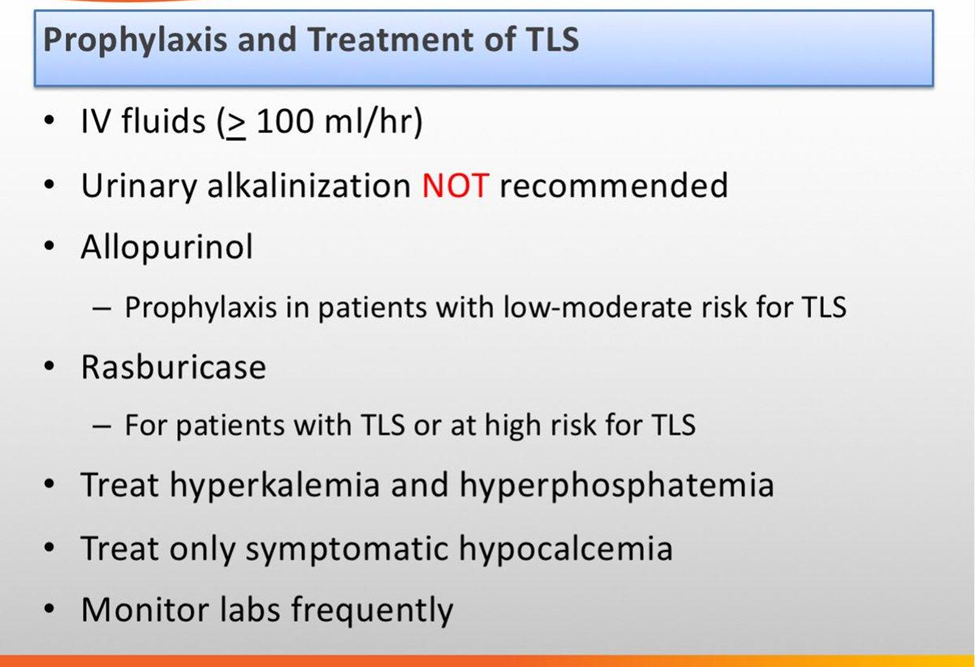Mr. Johnson is a 56 year-old male who is being treated for cancer of the bladder. He is receiving chemotherapy and the RN noticed that the oncologist has instructed the patient to drink 2-3 liters of water per day. In addition to staying hydrated, what is another rationale for encouraging fluid intake for this client?
To help prevent Tumor Lysis Syndrome.
Staying hydrated decreases oral dryness that patient may exhibit as a result of chemotherapy.
To help prevent new onset diabetes mellitus.
Because it is better to encourage water Vs. carbonated beverages.
The Correct Answer is A
A. To help prevent Tumor Lysis Syndrome.
Encouraging fluid intake is crucial for patients undergoing chemotherapy, especially when there's a risk of Tumor Lysis Syndrome (TLS). TLS is a potentially serious complication that can occur when cancer cells release their contents into the bloodstream, leading to metabolic imbalances. Adequate hydration helps prevent the concentration of these released substances and reduces the risk of TLS.

B. Staying hydrated decreases oral dryness that the patient may exhibit as a result of chemotherapy.
While hydration is generally important for overall well-being, oral dryness is not typically a direct consequence of bladder cancer chemotherapy. It might be a side effect of certain medications, but the primary concern in this case is likely related to preventing TLS.
C. To help prevent new onset diabetes mellitus.
The rationale for fluid intake in the context of bladder cancer chemotherapy is not typically related to preventing new onset diabetes mellitus. The primary focus is usually on managing potential side effects of chemotherapy and promoting overall health.
D. Because it is better to encourage water Vs. carbonated beverages.
While encouraging water over carbonated beverages is generally a healthy choice, the primary rationale for increased fluid intake in the context of bladder cancer chemotherapy is more specific and related to preventing Tumor Lysis Syndrome.
Nursing Test Bank
Naxlex Comprehensive Predictor Exams
Related Questions
Correct Answer is ["C"]
Explanation
A. Remove the intravenous catheter.
While removing the intravenous catheter is an important step, the immediate priority in cases of extravasation is to stop the infusion to prevent further leakage into the surrounding tissues. After stopping the infusion, the catheter can be carefully removed.
B. Pack the intravenous site with ice.
Cold compresses or ice packs are sometimes used in the management of certain types of extravasation to help reduce local swelling and vasoconstriction. However, the immediate priority is to stop the infusion (Choice C). After that, specific interventions, such as warm or cold compresses, may be employed based on the specific chemotherapy agent involved.
C. Stop the intravenous infusion.
This is the correct answer. Stopping the infusion is the first and most immediate action to prevent further leakage of the chemotherapy drug into the surrounding tissues, reducing the risk of tissue damage and adverse effects.
D. Attempt to aspirate residual medication from the patient’s vein.
While aspirating residual medication may be part of the overall management of extravasation, it is not the first action. The priority is to stop the infusion to prevent further damage. After stopping the infusion, the nurse may assess the situation and determine whether aspirating residual medication is appropriate.
Correct Answer is B
Explanation
A. Relieves nasal congestion
Dornase alfa is not used to relieve nasal congestion. It is specifically designed to address the thick, sticky mucus that can accumulate in the airways of individuals with cystic fibrosis (CF).
B. Decreases thick secretions
This is the correct answer. Dornase alfa is known for its ability to decrease the viscosity of thick secretions in the airways of individuals with CF. By breaking down the DNA within the mucus, it helps to thin and improve the clearance of the mucus.
C. Decreases pain
Dornase alfa is not primarily used to decrease pain. Its main action is related to improving respiratory function by reducing the thickness of mucus, which can help ease breathing difficulties associated with CF.
D. Suppresses cough
Dornase alfa is not used to suppress cough. In fact, it may increase coughing initially as it facilitates the loosening and clearance of mucus from the airways.
Whether you are a student looking to ace your exams or a practicing nurse seeking to enhance your expertise , our nursing education contents will empower you with the confidence and competence to make a difference in the lives of patients and become a respected leader in the healthcare field.
Visit Naxlex, invest in your future and unlock endless possibilities with our unparalleled nursing education contents today
Report Wrong Answer on the Current Question
Do you disagree with the answer? If yes, what is your expected answer? Explain.
Kindly be descriptive with the issue you are facing.
